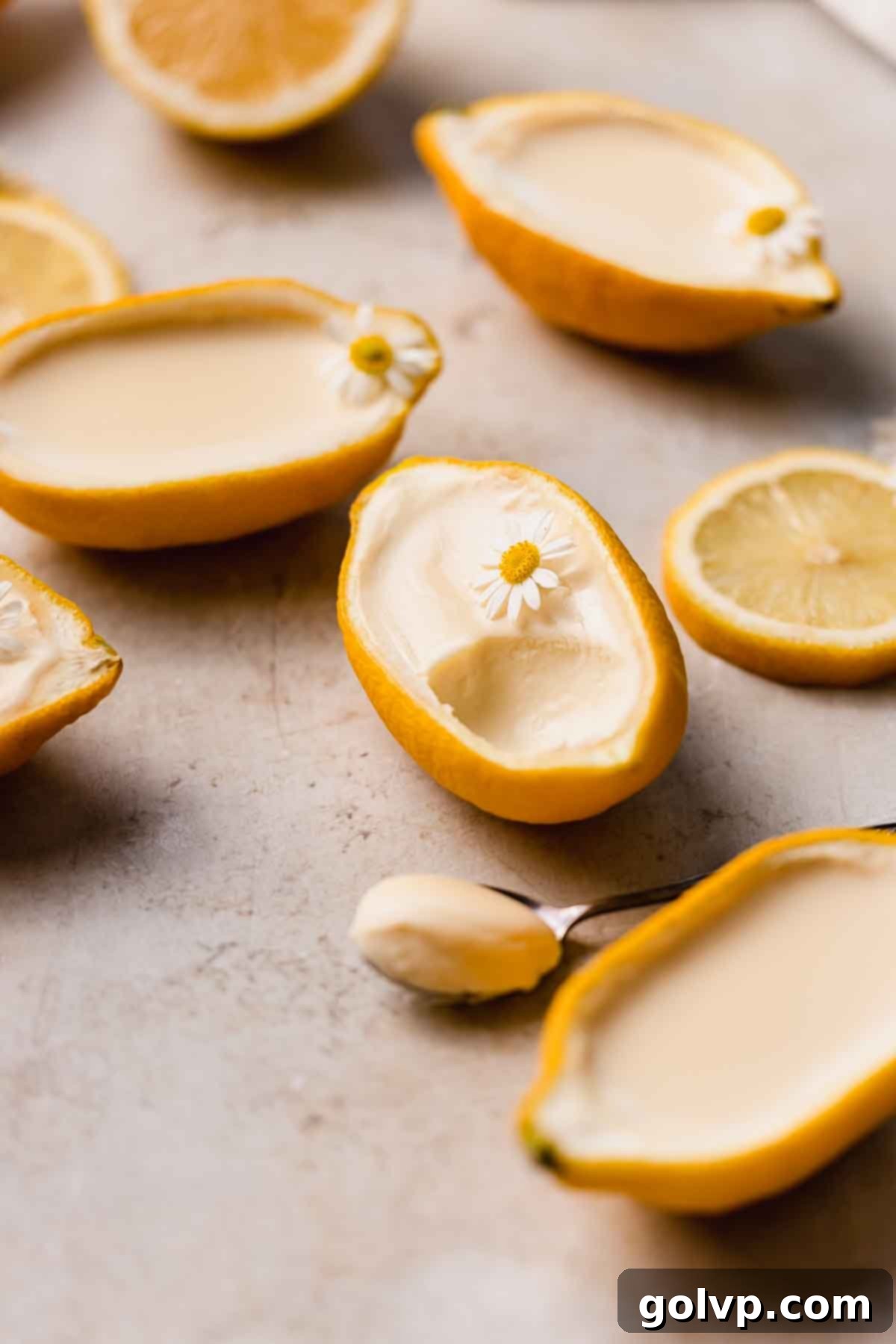Discover the Delight of Tea-Infused Lemon Posset: An Easy, No-Bake Creamy Dessert Recipe
Indulge in a truly exquisite dessert that marries the bright, zesty notes of fresh lemon with the subtle, aromatic complexities of your favorite tea. This tea-infused lemon posset is a remarkably easy, four-ingredient delight that utilizes the natural magic of lemon juice and heavy cream to create an incredibly creamy, refreshing, and utterly decadent treat. Unlike many other puddings or custards, this posset thickens without the need for eggs, cornstarch, or gelatin, relying solely on the acidic reaction between the lemon juice and heated cream. It’s a perfect no-bake dessert for summer entertaining, light enough to enjoy after a hearty meal, yet rich enough to satisfy any sweet craving. Serving it in hollowed-out lemon rinds adds an elegant touch that is sure to impress, but it’s equally delightful in small bowls or ramekins. The subtle tea infusion elevates the classic lemon posset, adding an unexpected layer of flavor that will leave your guests asking for the secret ingredient.
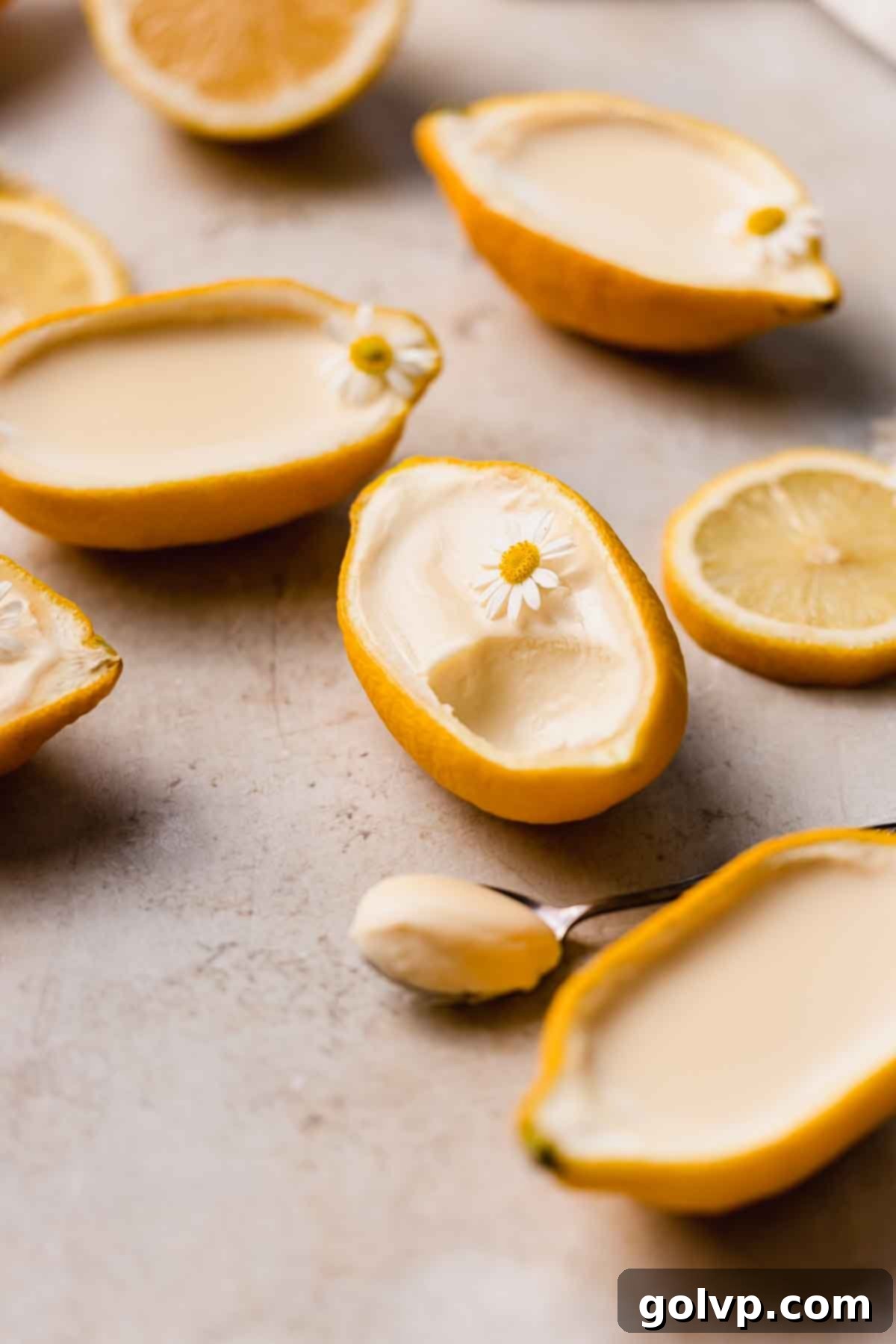
Skip straight to the full recipe and detailed instructions by clicking below!
[feast_advanced_jump_to]
🍋 Why You’ll LOVE This Tea-Infused Lemon Posset Recipe
This lemon posset isn’t just a dessert; it’s an experience. Here’s why it’s destined to become a staple in your recipe repertoire:
- Effortlessly Easy: Forget complicated techniques or a long list of obscure ingredients. This recipe calls for just a few common pantry staples and comes together with minimal fuss. It’s perfect for beginner bakers or anyone looking for a quick yet elegant dessert solution without the stress. You’ll be amazed at how such simple steps yield such a sophisticated result.
- Bursting with Tangy Lemon Flavor: Prepare for a vibrant citrus explosion! The fresh lemon juice and zest provide an invigorating tartness that perfectly balances the sweetness and richness of the cream. It’s a bright, zesty flavor that truly awakens the palate, making it an ideal refreshing dessert, especially during warmer months.
- Luxuriously Creamy Texture: This isn’t just creamy; it’s *ultra* creamy, boasting a melt-in-your-mouth texture that is akin to a rich pudding or a silky panna cotta, yet even more decadent. The high fat content of the heavy cream, combined with the magic of lemon, creates a smooth, velvety consistency that glides across your tongue, leaving a wonderfully satisfying finish.
- Uniquely Tea-Infused: What sets this posset apart is the clever addition of tea. Infusing the cream with tea leaves adds an incredible depth and aromatic complexity without any extra effort. As the cream heats up, it gently absorbs the delicate flavors of the tea, transforming a simple lemon posset into a gourmet delight. Whether you choose a soothing chamomile, a fragrant Earl Grey, or a bright green tea, the infusion process is seamless and adds an unforgettable dimension to the dessert.
If you appreciate creamy desserts with a sophisticated tea flavor, you absolutely must try my Earl Grey crème brulee – another fan favorite for its unique twist on a classic.
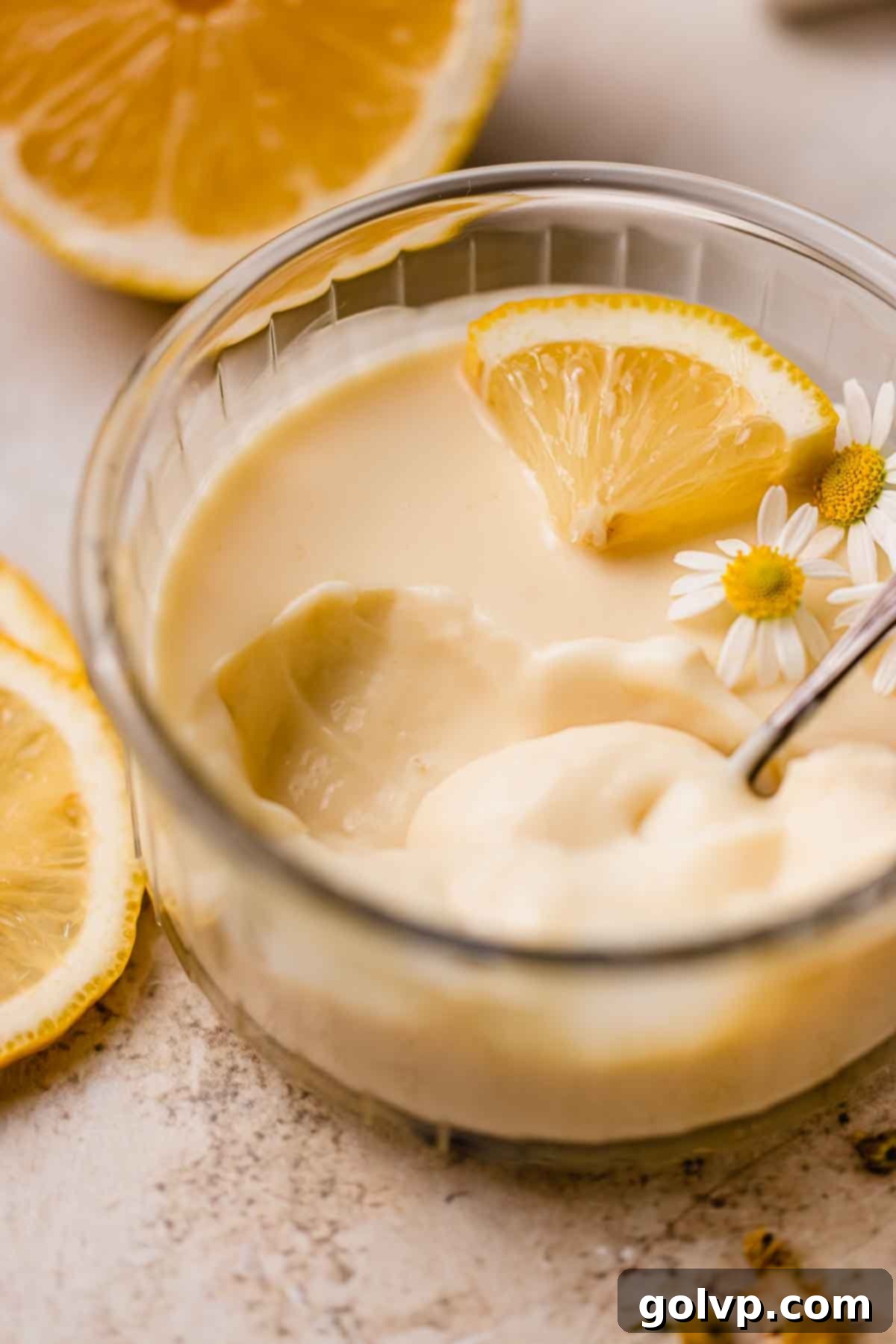
📝 Essential Ingredients for Lemon Posset
While a traditional lemon posset typically requires only three main ingredients (cream, sugar, and lemons), this recipe elevates it with a fourth essential: tea. This addition provides an extra layer of flavor and aromatic depth that truly makes this posset stand out.
For perfect results, read through all the tips for success below!
Full steps and ingredients can be found in the comprehensive recipe card at the bottom of this page.
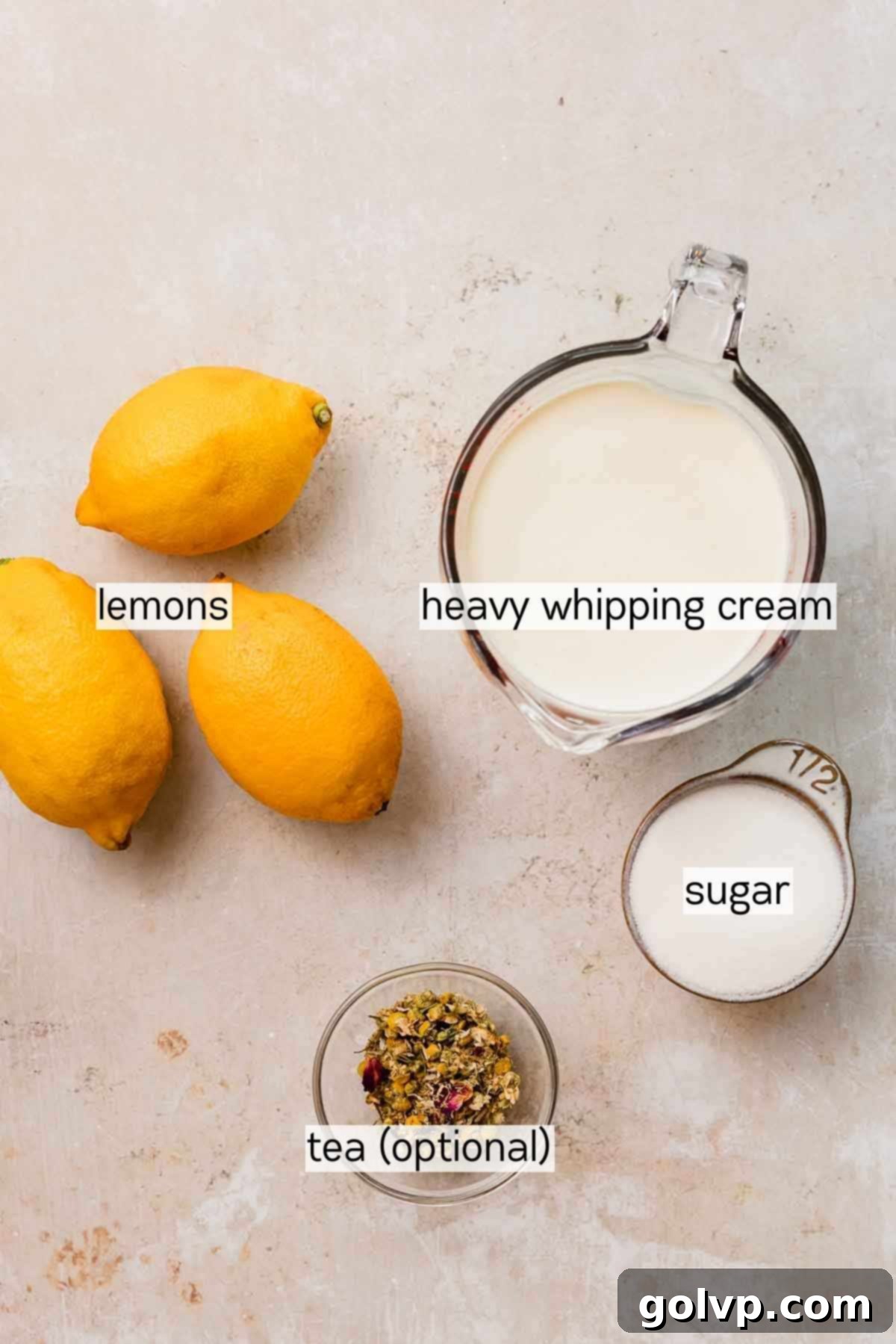
- Fresh Lemons: You’ll need approximately 3-4 medium-sized lemons, depending on how juicy they are, to yield enough zest and, crucially, a sufficient amount of fresh lemon juice. The juice is vital not just for flavor, but for thickening the posset. Lemon zest, on the other hand, provides concentrated citrus oils that infuse a brighter, more aromatic essence into the cream. If you plan to use the lemon rinds as charming serving cups, be sure to carefully halve them lengthwise and thoroughly clean out all the pulp and membranes after squeezing the juice.
- Your Favorite Tea: This is where the magic of infusion happens! Choose a high-quality loose-leaf tea or even your preferred bagged tea. I personally love a fragrant chamomile tea for its delicate floral notes that complement lemon beautifully. Other excellent choices include jasmine green tea for an exotic touch, robust black tea for a deeper flavor, or classic Earl Grey for its distinctive bergamot aroma, which pairs wonderfully with citrus. The beauty of this recipe is its adaptability to your personal tea preference.
- Heavy Whipping Cream (35% Milk Fat): The quality and fat content of your cream are paramount for achieving the perfect thick, rich, and smooth posset texture. Always opt for heavy cream or heavy whipping cream with a minimum of 35% milk fat. Lower fat creams, such as light cream or half-and-half, will not thicken properly, resulting in a runny dessert. The fat in the cream is what curdles when it reacts with the lemon juice, creating that signature luscious consistency.
- Granulated Sugar: Essential for sweetening the posset and balancing the intense tartness of the lemon. It also plays a role in the texture as it dissolves into the cream mixture.
- Pinch of Sea Salt: While optional, a tiny pinch of sea salt enhances and brightens all the other flavors, making the lemon zest more vibrant and the tea infusion more pronounced. It’s a small addition that makes a big difference.
My recent obsession with lemon-based desserts has led me to explore various forms of this tangy fruit. This lemon curd is another fantastic example, similar to posset in its bright lemon flavor but thickened with egg yolks rather than the lemon juice and cream interaction.
👩🍳 Step-by-Step Guide: How to Make Lemon Posset
Creating this elegant tea-infused lemon posset is surprisingly simple. Follow these detailed steps to achieve a perfectly creamy and flavorful dessert every time.
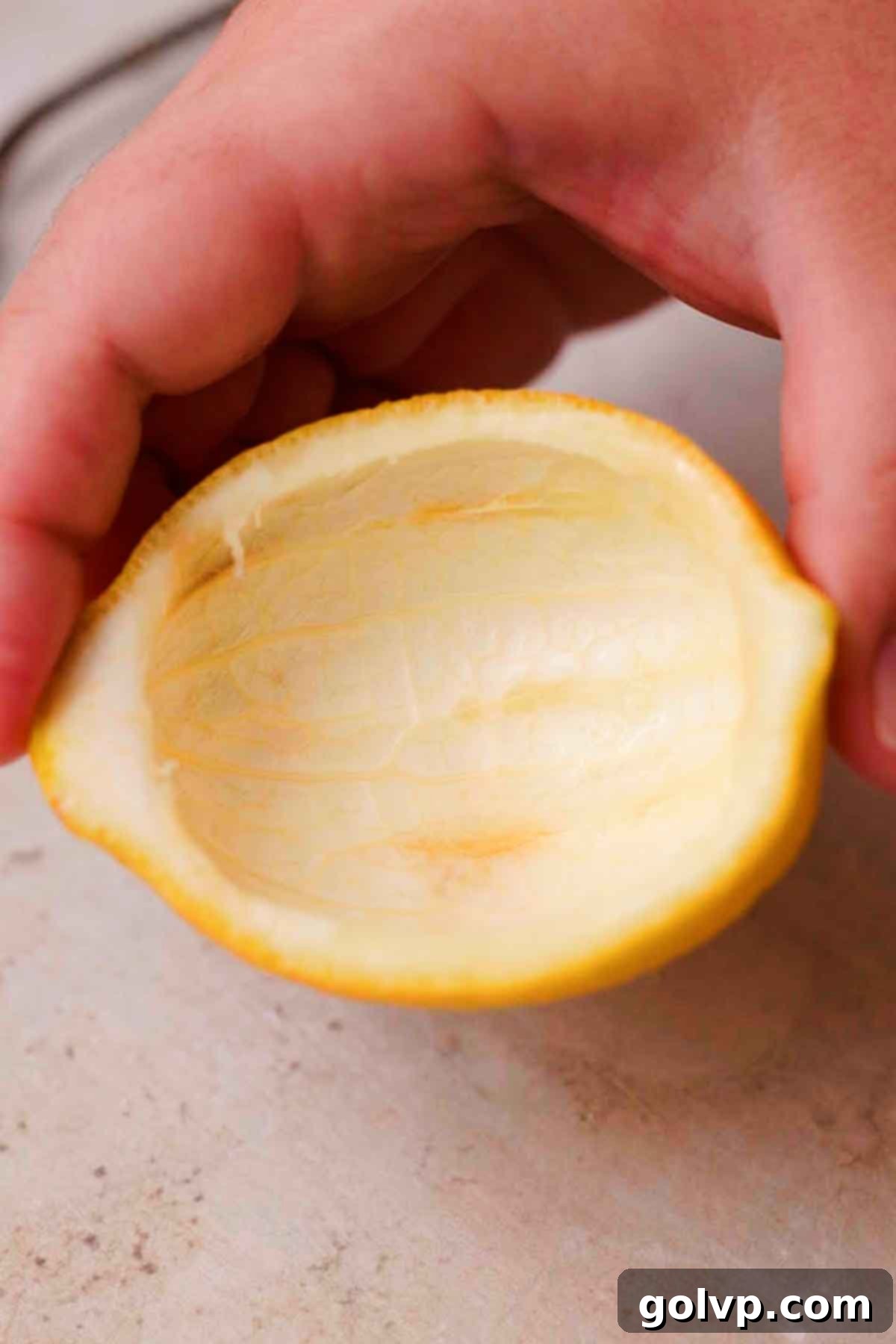
Step 1: Prepare Your Lemon Rinds (Optional, but Recommended for Presentation). If you plan on serving your posset in charming lemon rinds, select firm, unblemished lemons. Carefully cut each lemon in half lengthwise. Using a juicer or a reamer, thoroughly squeeze out all the juice, ensuring to collect every drop. Then, using a small spoon or your fingers, meticulously scoop out and peel away any remaining inner membranes and pulp. The goal is to create a clean, smooth, and sturdy vessel for your posset. Set these aside.
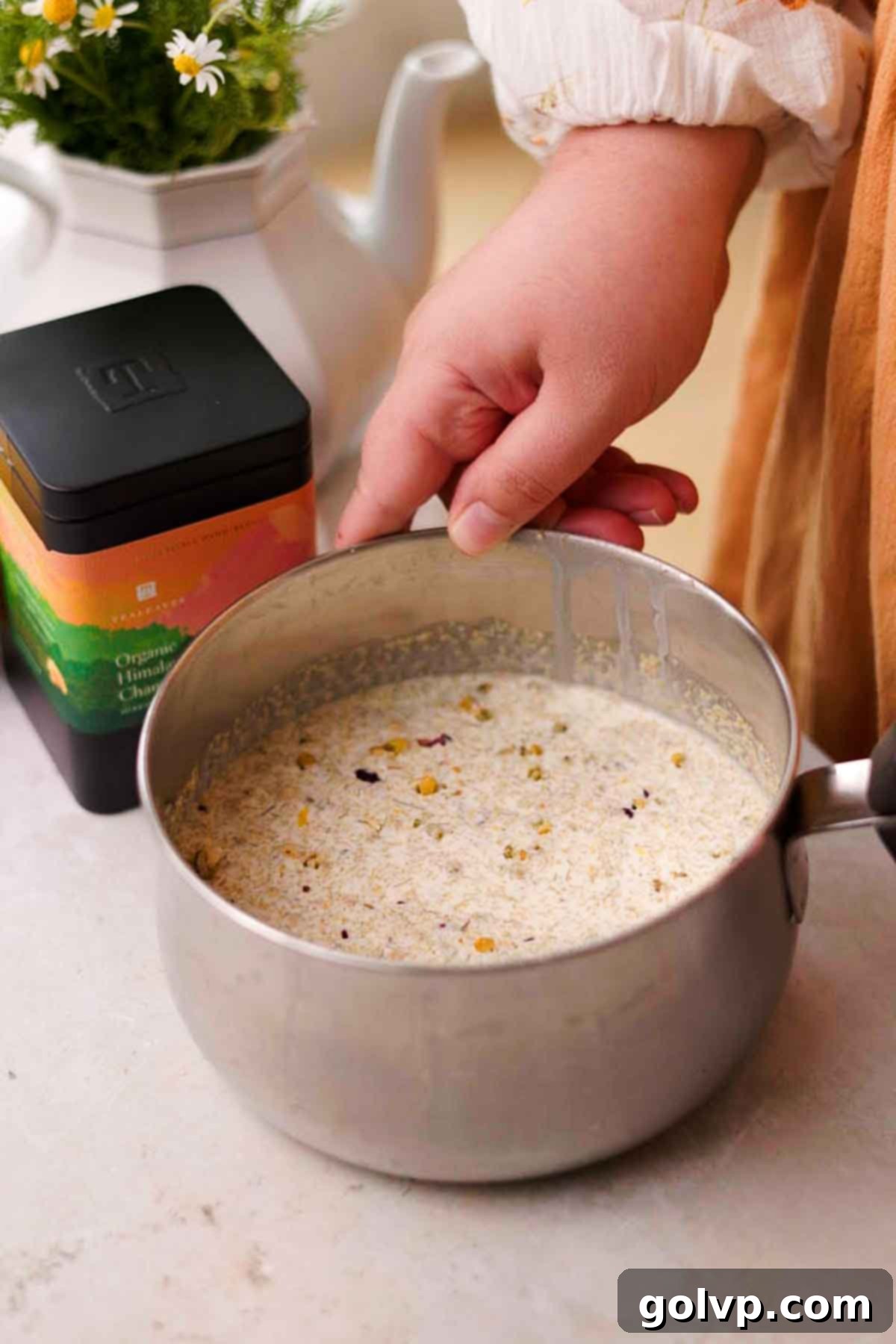
Step 2: Combine and Infuse the Cream Mixture. In a medium-sized, heavy-bottomed saucepan, combine the heavy whipping cream, granulated sugar, a pinch of sea salt, the aromatic lemon zest, and your chosen tea leaves. Ensure all ingredients are well-mixed before heating. This initial combination allows the tea and lemon zest to begin infusing their flavors even before the mixture comes to temperature.
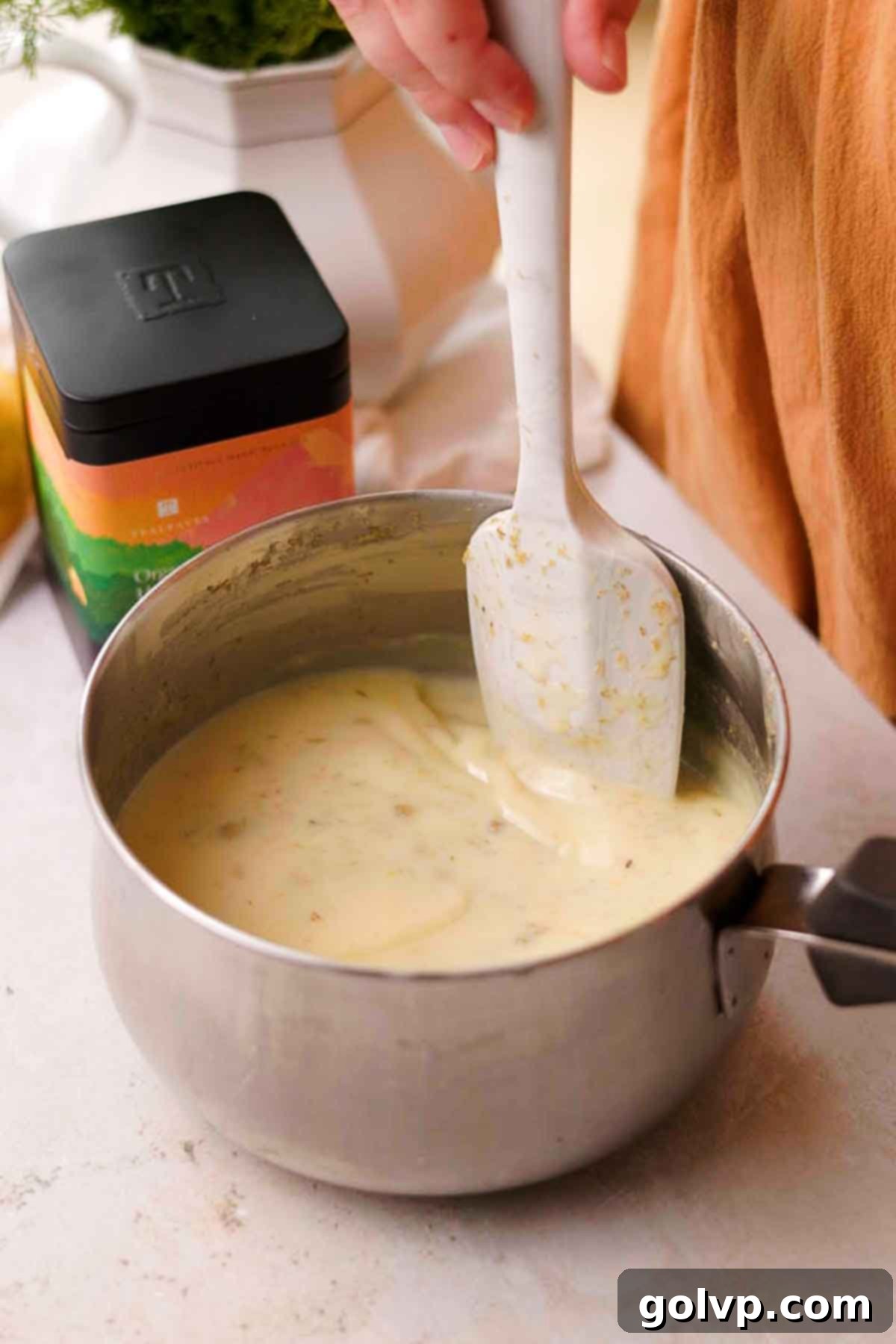
Step 3: Heat and Simmer for Thickening. Place the saucepan over medium-low heat. Stir the mixture continuously until the sugar fully dissolves and the cream gently comes to a boil. Once boiling, immediately reduce the heat to a low simmer to prevent it from boiling over. Allow it to simmer for precisely 5 minutes, stirring frequently throughout this period. This simmering time is crucial for reducing the cream slightly and preparing it to thicken when the lemon juice is added. Do not skip or shorten this step, as it’s key to the posset setting properly. You might notice the color slightly deepening to a creamy yellow.
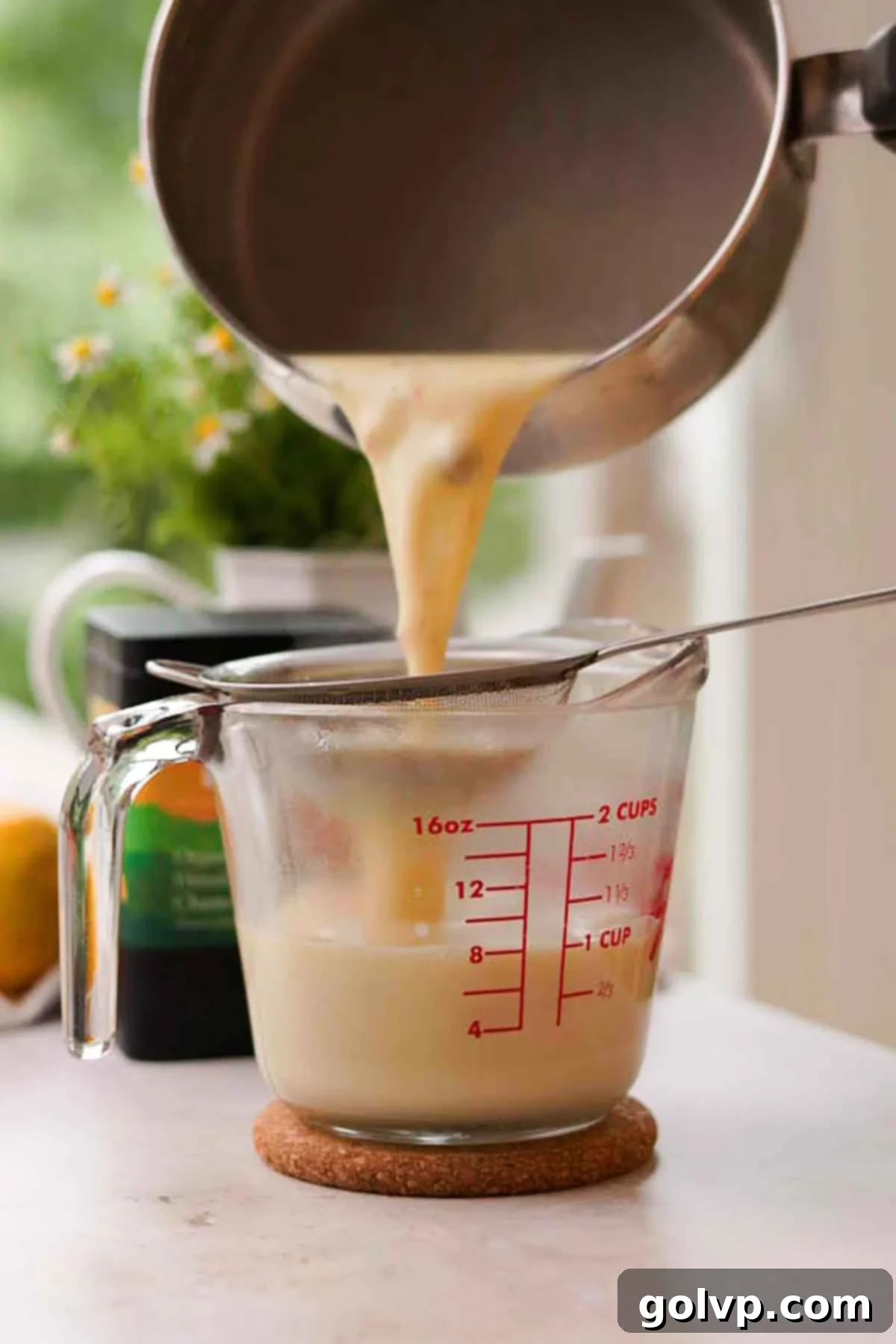
Step 4: Strain the Infused Cream. After simmering, carefully strain the hot cream mixture through a fine-mesh sieve into a clean vessel. A measuring cup or a jug with a spout is ideal for easy pouring in the next step. This straining process removes all the spent lemon zest and tea leaves, ensuring your posset has a perfectly smooth and silky texture, free of any gritty bits.
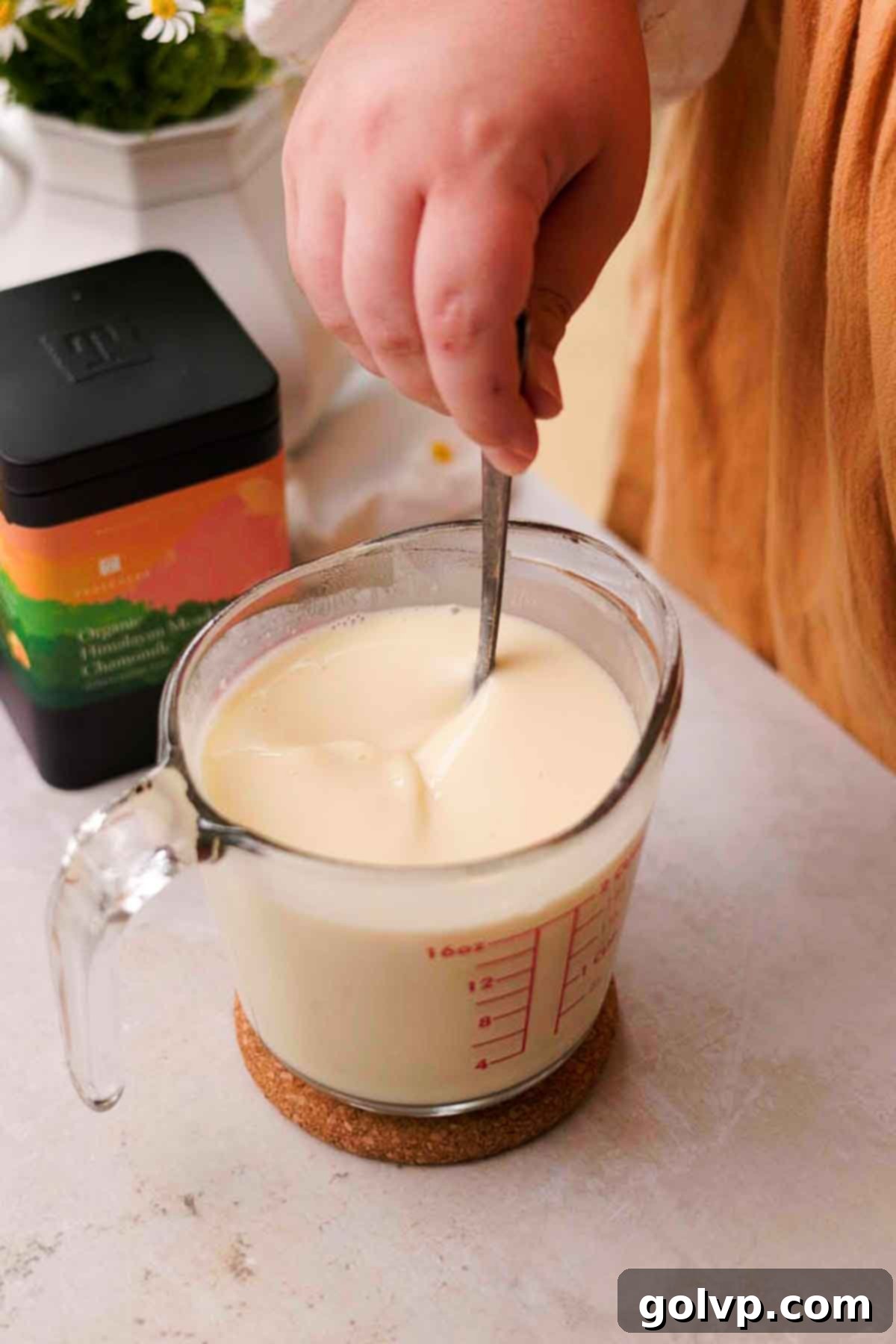
Step 5: Add Lemon Juice and Prepare Serving Vessels. To the strained cream mixture, add the freshly squeezed lemon juice. Stir vigorously and continuously for about 30 seconds to a minute. You’ll immediately notice a subtle change in consistency; the mixture will begin to thicken slightly as the lemon juice starts to curdle the cream. This is a crucial reaction that forms the basis of the posset’s texture. Next, prepare your serving vessels: if using lemon halves, arrange them snugly together on a plate or tray so they support each other and remain upright. If using ramekins, small bowls, or decorative cups, arrange four to six onto a larger plate or tray for easy transport to the fridge.
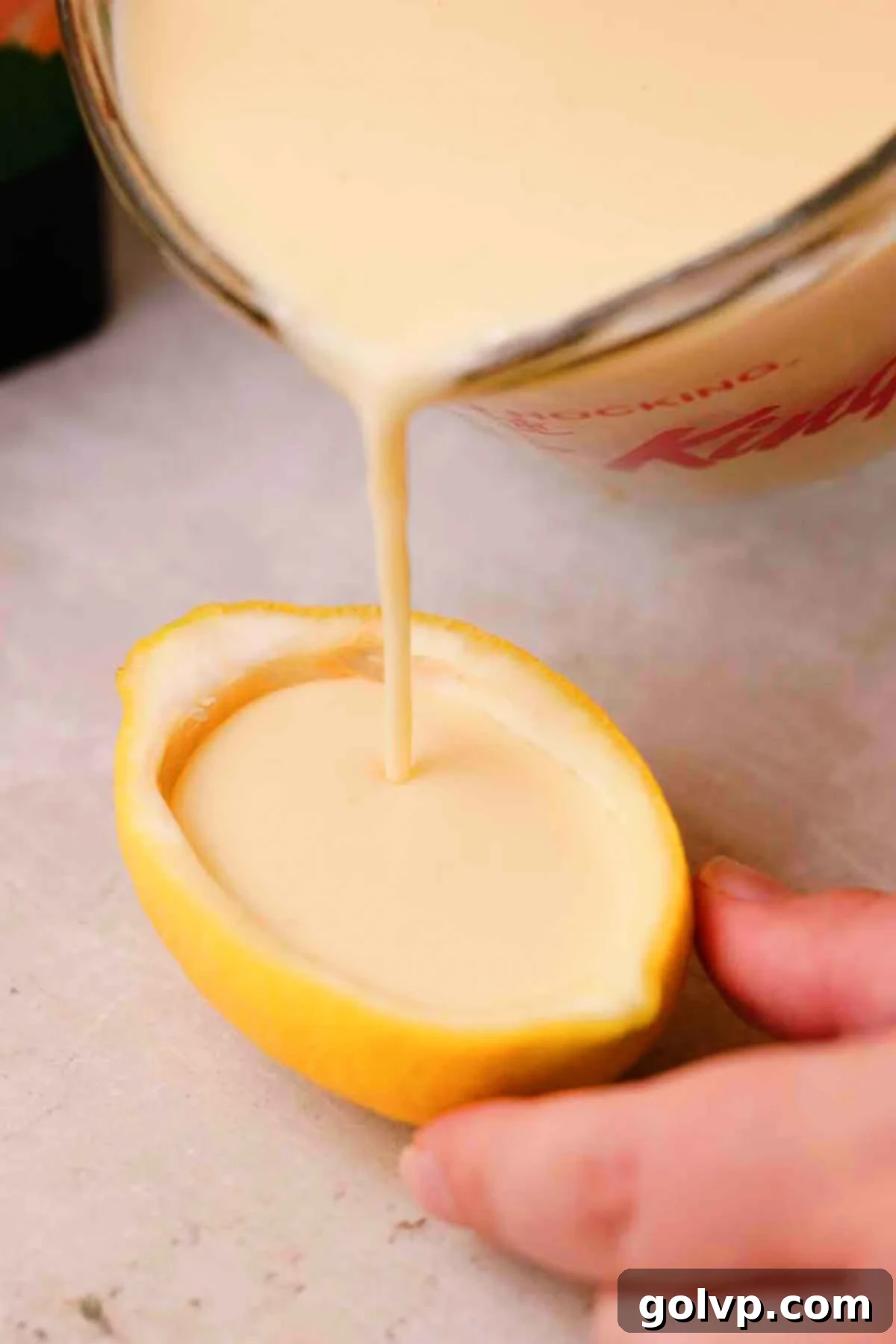
Step 6: Pour and Chill to Set. Carefully pour the warm posset mixture into your prepared lemon rinds, ramekins, or cups. Fill them to your desired level, leaving a small space at the top if you plan to garnish. Once filled, cover the possets (individually with plastic wrap or collectively with a plate if using rinds on a tray) and transfer them to the refrigerator. Allow them to chill for a minimum of 1 hour to set, but for the optimal thick, rich, and creamy texture, aim for 2-3 hours of chilling. The longer they chill, the firmer they will become. While they are best enjoyed within 24 to 36 hours for peak freshness and texture, they can be stored for up to 2 days.
✔️ Expert Tips for Perfect Lemon Posset Every Time
Achieving the ideal lemon posset is easy, but a few key details can make all the difference. Here are my expert tips to ensure your dessert is consistently silky, tangy, and perfectly set:
- Do Not Undercook the Cream and Sugar Mixture: This is arguably the most critical step for a properly set posset. The cream, sugar, and tea mixture absolutely needs to come to a full boil and then gently simmer for a minimum of 5 minutes. This simmering period is essential for reducing the liquid slightly and initiating the changes in the cream’s proteins that allow the lemon juice to thicken it effectively. If you cut this time short, your posset will likely remain too runny and won’t achieve that characteristic thick, creamy texture. Stir frequently during simmering to prevent scorching.
- Always Use Freshly Squeezed Lemon Juice: The quality of your lemon juice directly impacts both the flavor and the setting capability of your posset. Bottled lemon juice often contains preservatives and lacks the vibrant, fresh acidity of juice squeezed directly from whole lemons. Fresh lemon juice provides the purest, tangiest flavor and has the optimal acidity level needed to react with the heated cream and create the desired curdled, thick consistency.
- Chill Until Fully Set: Patience is a virtue when making posset! After pouring, the posset requires ample time in the refrigerator to properly set and develop its luxurious texture. While it might begin to firm up within an hour, for a truly thick, rich, and spoonable consistency, aim for at least 2-3 hours of chilling. For best results, consider making it several hours in advance or even the night before you plan to serve it. A well-chilled posset is always superior.
- Use High-Quality Heavy Cream: As mentioned in the ingredients, the fat content of your cream is non-negotiable. Ensure you are using heavy cream or heavy whipping cream with at least 35% milk fat. Anything less will not have enough fat to properly curdle and thicken when exposed to the lemon juice, leading to a runny or thin result.
- Consider Your Tea Choice Carefully: While the recipe encourages using your favorite tea, think about how its flavor profile will complement lemon. Delicate teas like chamomile or jasmine offer a subtle, aromatic background, while Earl Grey provides a more distinct, sophisticated note. Avoid overly strong or bitter teas that might overpower the lemon.
🥄 Make Ahead and Storage Tips
One of the many charms of lemon posset is how wonderfully it lends itself to advance preparation, making it an ideal dessert for dinner parties or busy schedules. You can easily make your tea-infused lemon possets the day before you plan to serve them. They hold up beautifully in the fridge and are often even better after a full night of chilling, as the flavors meld and the texture fully sets.
For optimal freshness and to prevent them from forming a slight “skin” on top, ensure they are properly covered. Individual ramekins or cups can be covered with a small piece of plastic wrap, pressed gently onto the surface of the posset. If you’re serving them in lemon rinds arranged on a tray, simply cover the entire tray with plastic wrap or a larger plate. Store them in an airtight container if possible for maximum protection. They will remain delicious and perfectly textured for up to 2 days in the refrigerator. However, it’s crucial to avoid using aluminum foil for covering, as the acidity of the lemon can react with the foil, potentially imparting an unpleasant metallic flavor to your delicate dessert. Stick to plastic wrap, lids, or ceramic plates.
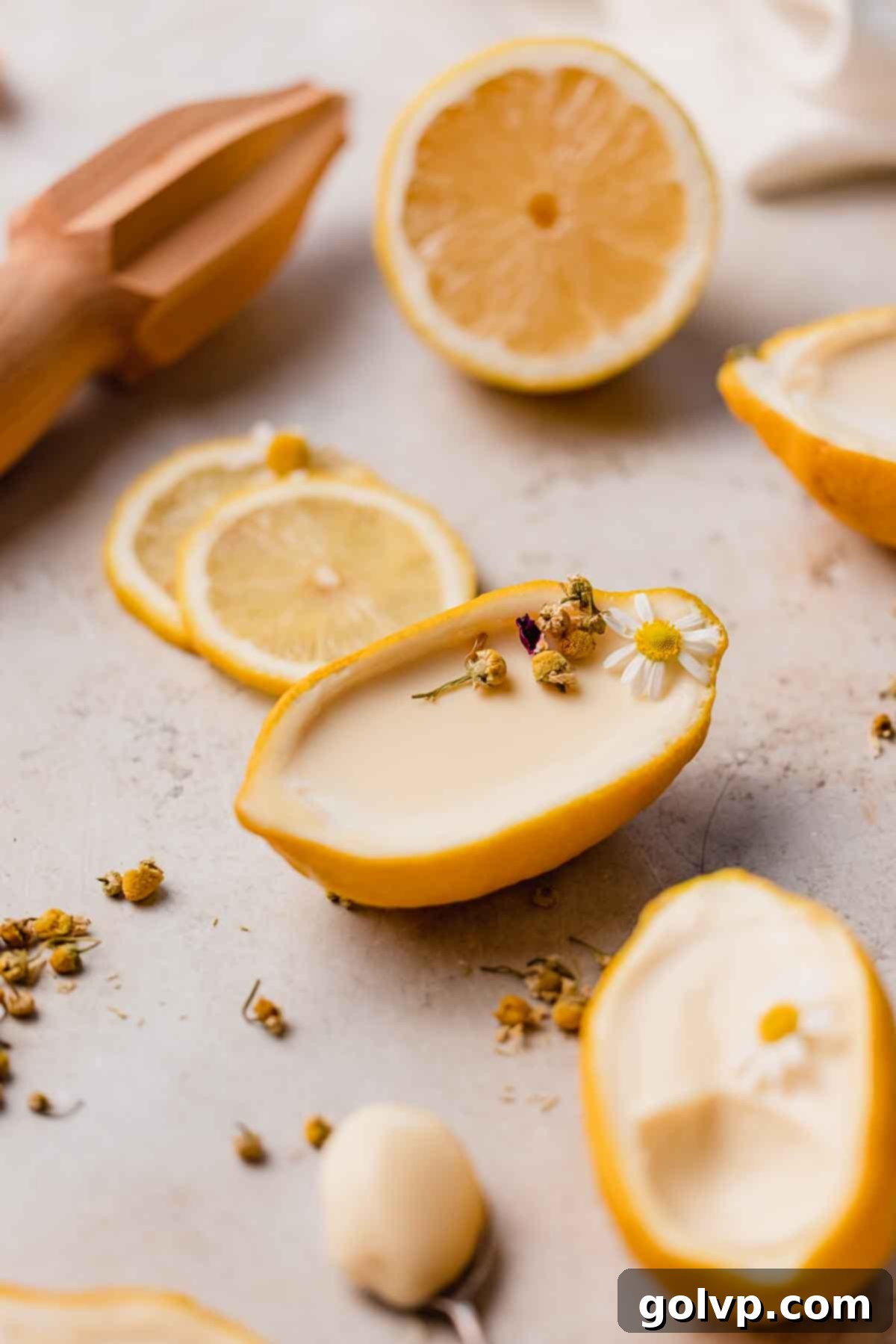
❔ What Exactly is Posset? A Culinary History
The term “posset” might sound exotic or unfamiliar to some, but this delightful dessert has a rich history originating from England. Historically, possets were far different from the creamy dessert we know today. They began as hot, spiced drinks, typically made from milk and curdled with wine or ale. These early possets were often consumed as comforting, nourishing, and even medicinal beverages, believed to have soothing and healing properties.
Over the centuries, as culinary trends evolved, so did the posset. By the 19th century, it underwent a significant transformation, moving from a warm, spiced drink to the cold, cream-based dessert familiar today. The curdling agent also shifted from wine or ale to the more accessible and brightly flavored citrus juices. Lemon juice, in particular, became the most common and beloved ingredient for its ability to effortlessly thicken the rich cream into a wonderfully smooth, tangy, and spoonable dessert. This unique method of thickening, relying purely on the interaction between acid and dairy fat without eggs or starch, is what distinguishes posset from other similar desserts like custards or puddings. Today, lemon posset remains the most popular flavor, celebrated for its simple elegance and refreshing taste.
If you have a penchant for English-inspired desserts with a citrusy twist, this lemon Victoria sponge, complete with homemade lemon curd, is another traditional treat you’ll adore.
☕ Elevate Your Posset: Infusing with Other Flavors
The beauty of this lemon posset recipe lies in its adaptability, especially when it comes to infusions. Since the cream needs to be heated anyway, taking a few extra minutes to infuse it with tea leaves or other aromatics is a brilliant way to add remarkable complexity and personalize your dessert. It’s an easy step that yields incredibly sophisticated results.
I specifically used chamomile tea in this recipe to give it a delicate, subtly floral twist that harmonizes beautifully with the bright lemon. However, the possibilities for infusion are vast:
- Other Teas: Experiment with different tea varieties. Earl Grey tea will introduce a distinctive bergamot aroma, making for a very elegant posset. Jasmine green tea offers a fragrant, slightly exotic note. Raspberry tea can provide a fruity, delicate sweetness that complements the tart lemon. Essentially, any tea that you enjoy drinking with lemon is a good candidate for infusion.
- Vanilla Bean: For a more classic and sophisticated flavor, split a whole vanilla bean down the middle and add it to the cream mixture as it heats. The tiny black seeds will infuse the posset with a rich, warm vanilla essence, creating a luxurious dessert that stands on its own. It’s a method similar to how vanilla elevates this no-churn lavender vanilla ice cream.
- Fresh Herbs: Consider infusing the cream with sprigs of fresh rosemary, thyme, or even a few basil leaves for a unique, savory-sweet twist. Just be sure to remove them after infusion to prevent overpowering the lemon.
- Spices: A cinnamon stick, a few cardamom pods, or a hint of star anise can add a warm, comforting dimension, especially if you’re serving the posset during cooler months.
Remember to always strain the cream mixture after infusion to remove any solid particles, ensuring your posset remains perfectly smooth. For a truly well-rounded tea time or dessert experience, consider serving the posset alongside a freshly brewed cup of the same tea flavor you used to infuse it. This creates a cohesive and delightful flavor pairing.
🍮 Troubleshooting: Why Your Posset May Not Be Thickening
Lemon posset is a fairly foolproof dessert, but occasionally, home cooks might encounter issues with it not setting properly. If your posset isn’t thickening as expected, here are the most common reasons and how to troubleshoot them:
- Insufficient Fat Content in Cream: This is the number one culprit. For a posset to set into a thick, creamy consistency, you *must* use heavy cream or heavy whipping cream with a minimum of 35% milk fat. Lower fat creams, such as whipping cream (often 30-34% fat), light cream, or half-and-half, simply do not contain enough fat to curdle effectively when exposed to acid. The fat is what forms the structure of the posset. Always check the label to ensure you have the right kind of cream.
- Not Heating the Cream Mixture Long Enough: The precise simmering time of the cream and sugar mixture is crucial. It needs to come to a full boil and then simmer for at least 5 minutes. This extended heat allows the cream to reduce slightly and prepares its proteins to react with the lemon juice. If you shorten this simmering time, the chemical reaction needed for thickening won’t fully occur, leading to a thin, soup-like consistency. The mixture should thicken slightly and deepen in color (to a creamy yellow) during this simmering phase.
- Not Enough Chilling Time: Even if the chemical reaction between the cream and lemon juice has occurred, the posset still needs adequate time in the refrigerator to firm up and reach its optimal texture. It requires at least 1 hour to begin setting, but for the best, most luxurious, and fully stable consistency, aim for 2-3 hours, or even overnight. Patience is key; don’t try to rush the chilling process by putting it in the freezer, as this can affect the texture.
- Using Bottled Lemon Juice: As mentioned in the expert tips, bottled lemon juice can sometimes lack the necessary acidity or contain additives that interfere with the natural thickening process. Always opt for fresh-squeezed lemon juice for reliable results and superior flavor.
- Incorrect Ratio of Ingredients: While this recipe provides precise measurements, if you’re experimenting or adjusting, ensure your ratios of cream to lemon juice are correct. Too much lemon juice can lead to a grainy texture, while too little won’t be enough to fully curdle the cream.
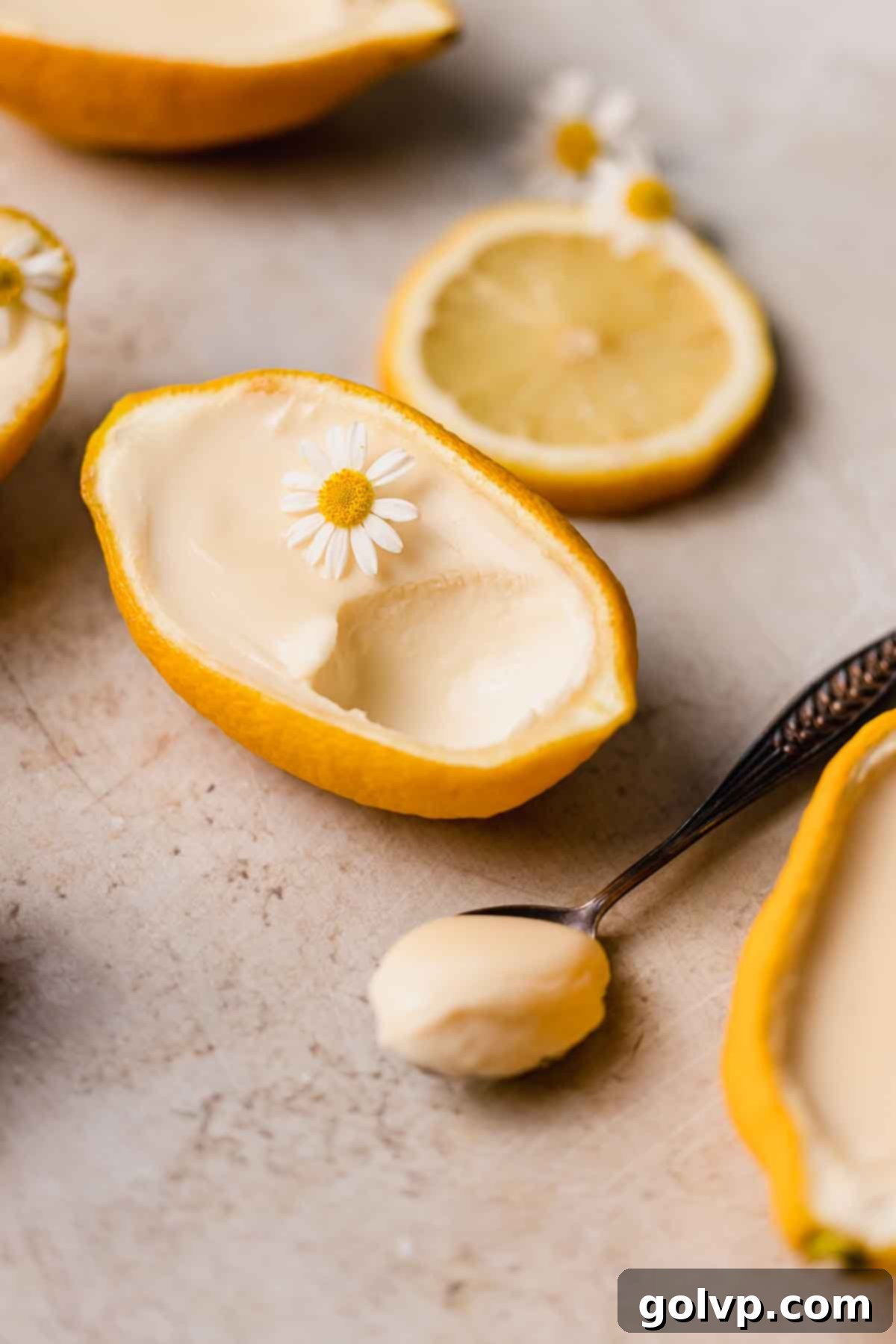
📖 Recipe FAQs About Lemon Posset
Absolutely! The beauty of posset is its versatility for infusions. You can certainly keep it plain with just lemon zest for a classic taste, or you can get creative. Besides tea (like chamomile as I did in this recipe, or Earl Grey, jasmine, and raspberry teas), you can infuse the cream with a split vanilla bean, fresh herbs like mint or rosemary, or even subtle spices like cardamom or cinnamon for a delightful twist. Just be sure to strain out any solids before adding the lemon juice.
At its core, a traditional lemon posset requires only three essential ingredients: fresh lemons, granulated sugar, and heavy whipping cream. In this particular recipe, I’ve added a fourth key ingredient—tea leaves—for a delightful infusion and a pinch of sea salt to enhance all the flavors. Both the tea and salt are optional, but highly recommended for an elevated taste experience. You can achieve a successful posset with just the core three ingredients if you prefer a simpler profile.
The magic behind lemon posset’s thickness is a simple yet fascinating chemical reaction. The acidity from the lemon juice causes the proteins in the hot heavy cream to curdle and thicken. This process, similar to how milk curdles when lemon juice is added, creates an ultra-smooth, thick, and creamy texture that resembles a pudding or a set custard. Crucially, this means you don’t need any eggs, cornstarch, gelatin, or other thickeners to achieve the desired consistency, making it a truly unique and easy dessert.
No, it is highly recommended to use heavy whipping cream with a minimum of 35% milk fat. Lower fat creams (like light cream, half-and-half) or regular milk do not contain enough fat to properly curdle and thicken when combined with lemon juice. Using these alternatives will result in a runny, unset posset. The fat content is essential for creating the characteristic luxurious texture.
To achieve a perfectly smooth posset, make sure to strain the cream mixture through a fine-mesh sieve after simmering and before adding the lemon juice. This removes all the lemon zest and tea leaves, preventing any grainy texture. Also, stir the lemon juice in vigorously for about 30 seconds to ensure it’s fully incorporated and begins the curdling process evenly. Lastly, proper chilling is key; an unset posset might appear less smooth.
🍋 More Delicious Lemon & Creamy Dessert Recipes
If you’ve fallen in love with the tangy, creamy goodness of this tea-infused lemon posset, then you’ll undoubtedly enjoy exploring these other delightful recipes from my kitchen. Each one celebrates vibrant flavors and satisfying textures, perfect for any occasion:
- Classic Homemade Lemon Curd
- Earl Grey Crème Brûlée
- No-Churn Lavender Vanilla Ice Cream
- Homemade Strawberry Curd
Did you give this delightful tea-infused lemon posset recipe a try? I would be thrilled to hear your thoughts! Please consider rating this recipe and sharing your experience in the comments section below. If you share your beautiful creation on Instagram, remember to tag @flouringkitchen so I can see it! For more tempting recipe ideas and to save your favorites, be sure to follow me on Pinterest.
📖 Recipe
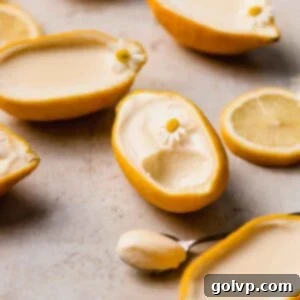
Tea-Infused Lemon Posset
Mary
Pin Recipe
Shop Ingredients
Equipment
-
ramekins or cups alternatively, use hollowed out lemon skins for an elegant presentation
-
Small Saucepan
-
Fine-mesh sieve
Ingredients
- 2 cups heavy whipping cream (35% milk fat)
- ½ cup granulated sugar
- ⅛ teaspoon sea salt
- 1 tablespoon lemon zest grated from fresh lemons
- 2 tablespoons tea leaves use your favorite high-quality tea, I used chamomile
- 6 tablespoons fresh lemon juice from about 3-4 lemons
Shop Ingredients on Jupiter
Instructions
-
Prepare Lemon Rinds (Optional): If you plan to use lemon rinds as serving vessels for your lemon posset, carefully cut the lemons in half lengthwise. Using a juicer or reamer, gently squeeze out all the juice, reserving it for later. Once juiced, meticulously remove and peel away the inner membranes and pulp from each half to create clean, smooth, and empty cups. Set these aside on a tray.
-
Infuse the Cream Mixture: In a medium-sized, heavy-bottomed saucepan, combine the heavy whipping cream, granulated sugar, sea salt, grated lemon zest, and your chosen tea leaves. Stir all ingredients together thoroughly to ensure the sugar begins to dissolve. Place the saucepan over medium-low heat and bring the mixture to a gentle boil, stirring occasionally. Once boiling, reduce the heat slightly to maintain a steady simmer and continue to simmer for exactly 5 minutes, stirring frequently to prevent the bottom from scorching. This simmering step is critical for the posset to set properly.2 cups heavy whipping cream, ½ cup granulated sugar, ⅛ teaspoon sea salt, 1 tablespoon lemon zest, 2 tablespoons tea leaves
-
Strain and Add Lemon Juice: Carefully strain the hot cream mixture through a fine-mesh sieve into a clean heatproof vessel with a spout (such as a large measuring cup or jug). This step removes all the tea leaves and lemon zest, ensuring a perfectly smooth posset. Immediately add the fresh lemon juice to the strained cream mixture and stir vigorously for about 30 seconds to combine it thoroughly. You will notice the mixture begin to thicken slightly as the lemon juice curdles the cream.6 tablespoons lemon juice
-
Portion into Serving Vessels: If you are using the cleaned lemon rinds, arrange them snugly on a plate or tray, positioning them close enough so they support each other and don’t tip over. If opting for ramekins or small bowls, arrange four to six of them onto a larger plate or tray for easy handling. Carefully pour the posset mixture into your chosen serving vessels, filling each evenly.
-
Chill to Set: Cover the portioned possets—either individually with plastic wrap pressed onto the surface or by covering the entire tray with plastic wrap or a plate—and place them into the refrigerator. Allow them to chill for at least 1 hour to begin setting. For the ideal thick, creamy, and fully set texture, I highly recommend chilling for 2-3 hours, or even overnight. The possets are best enjoyed within 24 to 36 hours for peak freshness and consistency.
Video
Notes
Posset Flavor Ideas for Infusion: Don’t limit yourself to chamomile! This recipe is incredibly adaptable to various infusions. Experiment with other tea varieties like fragrant jasmine green tea, robust Earl Grey tea, or even a delicate raspberry tea for a fruity note. Beyond teas, you could also infuse the cream with fresh lavender buds for a floral touch, or split a whole vanilla bean for a classic, rich vanilla flavor. If you prefer, you can also skip the infusion part entirely and keep the posset simple, allowing the pure lemon flavor to shine through.
Essential Tips for Success: To guarantee a perfect, creamy, and beautifully set lemon posset every time, keep these key points in mind:
- Simmer Time is Crucial: Ensure you simmer the cream and sugar mixture for the full 5 minutes. This step is vital for the cream to properly reduce and prepare for the thickening reaction.
- Fresh Lemon Juice Only: Always use freshly squeezed lemon juice for the best possible flavor and to ensure the posset sets correctly. Bottled juice can alter the results.
- Chill Thoroughly: Patience pays off! Allow your possets to chill in the refrigerator until they are fully set. While 1 hour is the minimum, 2-3 hours is ideal for that perfect thick and creamy consistency.
